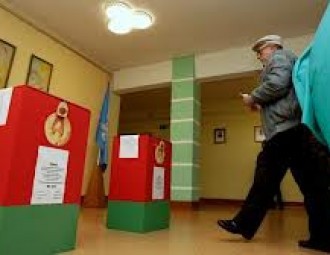Andrei Yahorau: Nomination of Statkevich as a united candidate is of symbolical significance

Belarusan opposition has been discussing the idea of nominating a united candidate for the Presidency from pro-democracy forces throughout the year in vain.
However, surnames of potential candidates have never been presented to the public. It seems that the opposition politicians are afraid to take upon this responsibility.
- The question now is not about personalities or possibility for opposition to nominate someone as a presidential candidate, but rather about insufficient resources for doing that and organizing a proper election campaign, - noted Andrei Yahorau, Director of the Centre for European Transformation, in the interview with the EuroBelarus Information Service. – There is no sense in choosing a united candidate now, as the opposition will hardly decide anything in the forthcoming election and will only lose its time, efforts, resources and so on.
- They say that opposition hasn’t yet found the required sponsors on order to organize effective election campaign.
- Usually sponsors meddle in Belarus’ political process, recommending something to political forces. Usually these recommendations are contrary to the logic of situation in Belarus.
But now I don’t know what the Western donors are prompting us to do.
- How can you account for the idea to nominate Mikalai Statkevich as a united candidate who might still be in prison when election will take place?
- Nomination of Statkevich as a united candidate might be the only sensible initiative of the Belarusan opposition.
Nomination of Statkevich as a united candidate has at least some symbolical significance, which might demonstrate internal unity among opposition political forces and Belarus’ civil society. It will at least demonstrate civil stand of opposition forces towards Belarusan election, as well as express solidarity with the political prisoners in the person of Statkevich.
All the rest looks like utter nonsense.
- Why doesn’t an alternative to Lukashenka appear in Belarus?
- It has to do with several factors.
First, the authorities are doing everything to prevent the appearance of any figure that would equal Lukashenka in rate and significance. It applies not only to political, but also to the cultural workers, sportsmen, and so on.
Secondly, diversity within the civil society and political sources is cultivated by foreign sources, who are convinced that the more pluralism the better. But this policy leads to the situation when none of the figures that become more famous and recognized can aspire to leadership, as they will immediately be drown.
Opposition leaders and civil society activists are not bound to trust anyone except themselves or assume anyone to be a leader. So any attempt to exceed the common level causes aggressive reaction within the democratic society.
- Are there any optimists in the opposition who still believe that there will be real possibility to fight with Lukashenka at the election 2015?
- There are always optimists. Moreover, every election campaign presumes upsurge of activity. Every time new sources that are trying to argue something without analysis of the previous situation appear.
The authorities also promote this situation, as they need at least some alternative. So they stir up such moods to provide themselves with the necessary level of mobilization of electorate at the election.
All this leads to a new burst of political optimism and youth activity; and I think the same will happen at the forthcoming election.
- Let’s take another look at the nomination of Statkevich. It is clear that he won’t be registered as a candidate to the Presidency. In this case can the plan for boycotting election have a new turn?
- Let me repeat that nomination of Statkevich as a united candidate is of symbolical significance, which only demonstrates internal unity among opposition political forces and expresses solidarity with the political prisoners. There will be no other results from this action.
Boycott and participation in the election are equally thoughtless things to do. Opposition can’t organize real boycott; the only possible way to organize it is to ignore the election and abstain from taking part in any forms of electioneering, even from observing the election.
Let the authorities amuse themselves; we need to devote ourselves to real things.
-
03.01
-
07.10
-
22.09
-
17.08
-
12.08
-
30.09








































